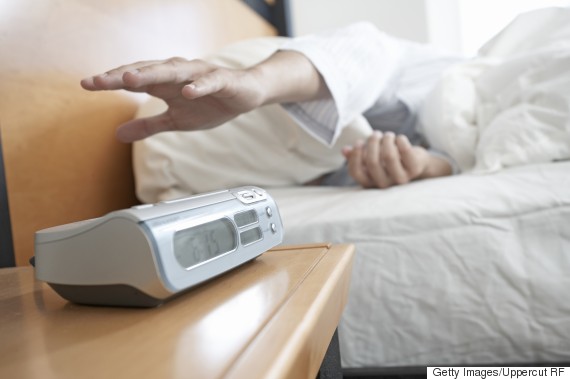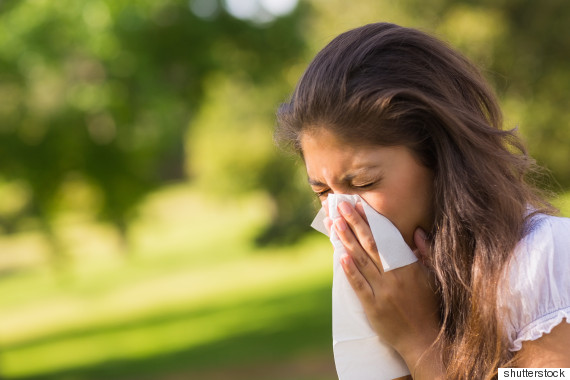How to simmer-down after the morning commute, 4 p.m. snack craving and more.
By Emma Haak
The Alarm Clock Buzz

No surprise that the very thing that jolts you unhappily awake elicits a stress response, driving up your heart rate and blood pressure by two to three points, according to Japanese research. In older people or those prone to heart problems, this sudden jarring can increase heart attack risk.
Your simmer-down plan: If you find that you truly dread your alarm, consider a gradual-awakening alarm, like a wakeup light, which slowly illuminates the room to rouse you. Or use a health tracker like Jawbone Up that nudges you with vibrations when you're in a lighter stage of sleep. (And if you're taking a midday nap and don't have anywhere pressing to be, consider setting no alarm at all. The researchers in the study found that 71 percent of young people and 90 percent of older people can wake themselves up "relatively punctually" after a short snooze -- and that's far easier on the heart.)
The Morning Rush Hour
No, we're not talking about commuting to work (though more on that in a second), we're talking about the rush of getting out of the door, just hoping you have everything together. Is that your smartphone still sitting on the counter?
Your simmer-down plan: Eat a stress-relieving breakfast as kind of a preemptive strike. One study in PNAS found that mice who were fed yogurt in the morning exhibited less anxiety and depression, likely because the good-for-you probiotic bacteria regulate certain brain neurotransmitters that rule mood.
Morning (and Evening) Commute

We couldn't get through this list without a nod to the hell that is your commute. While you've no doubt heard the research about how diabolical the daily schlep can be for your health, you can do something about it.
Your simmer-down plan: A 2013 Swedish study suggests that feeling satisfied with your commute -- being entertained or social while on the road, rather than feeling bored or like you're wasting time-- improves overall happiness. "Listening to all the bad news on the news only drives down your mood and makes travel time feel worse," says clinical psychologist Elizabeth Lombardo, the author of Better Than Perfect. Instead, catch up (hands-free if you're in the car) with someone positive in your life or listen to something that makes you feel as if your time is well spent, like a compelling podcast or audiobook.
4 P.M. Snack Alert
You know stress makes you want to eat. But, surprisingly, it peaks at one specific time of the day: the late-afternoon witching hour. That's when stress makes you attracted to food like a hungry bear in the woods, according to a 2015 study in Appetite. Researchers tracked adults' hunger and stress levels across an entire week and found that the highest risk for tension-driven hunger was Monday though Friday at 4 p.m.
Your simmer-down plan: You know the drill -- keep healthy snacks around for those rough hours and come up with a strategy to deal with the stressor that sends you to the vending machine. If your office is the root of your unease, here's one strategy: Planning tonight how you'll react in the future to combative coworkers, villainous underminers or a meeting with your boss that you dread ("If this happens, I'll say/do this...") can help you cope with stress, suggests 2015 research in the Journals of Gerontology.
The Afternoon Achoos

If you suffer from seasonal allergies, you know how the coughing, sneezing and runny nose can make you supremely unhappy. You're not imagining it: Allergy sufferers have higher rates of depression and sleep problems than healthy individuals, and report lower moods when their symptoms flare up. Midday and afternoon typically sees the highest pollen counts, inducing the most misery.
Your simmer-down plan: Avoid outdoor exercise in the afternoon to quell potential flares. Follow the other tips in this list -- a 2014 study in the Annals of Allergy, Asthma & Immunology found that emotional stress can set off an allergy attack.
Walking Through Your Front Door
The rockiest parts of the day are behind you, and it feels amazing, right? Well, in a study that shocked everyone, Penn State researchers found people had lower levels of the stress hormone cortisol coursing through their veins when they were at work than when they were at home. Working, they note, is associated with better mental and physical health and can offer women a happy respite from household duties.
Your simmer-down plan: The researchers explain that women in search of a greater work-life balance may think about leaving the workforce, but the study shows that this decision can backfire. Instead, if you're struggling, they suggest trying to add flexibility into your schedule. For example, check with your boss if telecommuting one day a week (even every other week) is doable. And, of course, see how you and your partner can find support for each other -- if hiring a babysitter or housecleaner isn't an option, maybe band together with other over-stretched parents with kids in the same class as yours to host a study group that rotates between houses -- giving one another a break a few nights a week.


